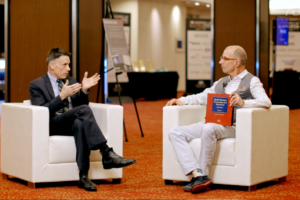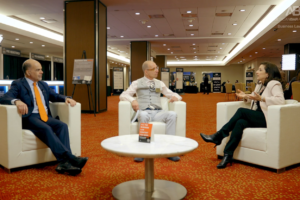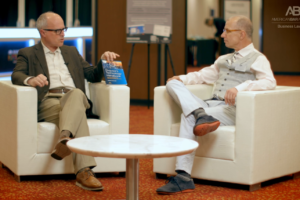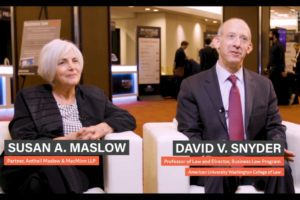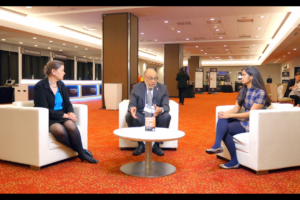CURRENT MONTH (June 2022)
By Mark D. Hobson, Partner, Halloran Farkas + Kittila LLP
In a recent case before the Delaware Court of Chancery—Deann M. Totta, et at. v. CCSB Financial Corp., WL 1751741 (Del. Ch. 2022)—Chancellor Kathaleen St. J. McCormick determined that a corporate charter may not alter either the fiduciary obligations of directors or the attendant equitable standards that courts apply when enforcing such obligations. The backdrop for the case involved a proxy contest by a litigious, insurgent shareholder (the “Insurgent”), whose wholly owned company along with the Insurgent’s board nominees challenged certain actions of the board of directors of the defendant (the “Board”), a holding company (the “defendant”) that owns a small community bank with three branches in Missouri (the “bank”). The bank had been underperforming financially for several years compared to its peers. And the Insurgent, who also owns, among other businesses, a Missouri bank with several branches, had been trying since 2011 to elect members to the Board. The existing members of the Board tried to justify their actions by characterizing the Insurgent as a “corporate raider” who intended to take control of the bank and then sell it.
This case involved the Insurgent’s efforts to get his nominees elected to the Board at the defendant’s 2021 annual meeting (“2021 meeting”) and, in particular, centered on anti-takeover provisions in the defendant’s Certificate of Incorporation (“COI”) that were adopted and filed with Delaware on a “clear day” in 2002. These anti-takeover provisions included a voting limitation provision (i.e., no shareholder or group acting in concert could vote shares in excess of 10% of the defendant’s outstanding shares of common stock) and a conclusive-and-binding provision (i.e., determinations made in good faith and on reasonably available information—a business judgment standard—by the Board regarding the voting limitation provision shall be conclusive and binding).
Prior to the 2021 meeting, the Board held a meeting and concluded that the Insurgent and some others (the “Insurgent Group”) were “acting in concert in order to get their alternate slate elected” to the Board at the 2021 meeting, in violation of the voting limitation provision. As a consequence, over 30,000 votes of the Insurgent Group were not counted, which resulted in the Board’s nominees (not the Insurgent’s) being elected at the 2021 meeting—it was concluded that but for the withholding of these shares, the Insurgent’s nominees would have been elected instead. Shortly after the 2021 meeting, the plaintiffs filed a complaint seeking declaratory judgment with the Delaware Court of Chancery under § 225 of the DGCL, seeking to have it determined that (i) the withholding of those votes was improper and (ii) the Insurgent’s nominees were actually elected to the board as a consequence.
Chancellor McCormick’s legal analysis first addressed the issue concerning the applicable analytical framework for resolving the parties’ dispute. After reviewing and analyzing the arguments posited, and the caselaw cited, by defendant, the court ultimately determined that the conclusive-and-binding provision was an attempt to modify improperly the Board’s fiduciary duties and attendant judicial standard of review. Enhanced scrutiny was the proper test to apply, not the business judgment standard. The court also found that parties were not “acting in concert,” as the Board had concluded, because there was no evidence of any agreement, arrangement, or understanding to act in concert or any quid pro quo. As a consequence, Chancellor McCormick found that Board’s decision not to count the 30,000 plus votes of the Insurgent Group to be improper and in violation of the DGCL. Given that enhanced scrutiny was the proper test to apply, the court found that the primary purpose of the Board’s actions was to interfere with the sacrosanct voting rights of shareholders in a contested election for directors, without any compelling justification.
Manti Holdings, LLC v. Carlyle Group Inc., C.A. No. 2020-0657-SG (Del. Ch. June 3, 2022) (Glasscock, V.C.)
Court of Chancery Denies Motion to Dismiss Breach of Fiduciary Duty Claims Against The Carlyle Group and Three Director Defendants, Finding that The Carlyle Group Received a Unique Benefit in its Capacity as a Controlling Stockholder of Authentix and that the Sale Transaction was Subject to Entire Fairness Review
By Malisa C. Dang, Christopher D. Renaud, and Robert D. Ward, Potter Anderson & Corroon LLP
In this memorandum opinion, the Court of Chancery denied a motion to dismiss claims for breach of fiduciary duty and unjust enrichment arising from the sale of Authentix Acquisition Company, Inc. (“Authentix”). Plaintiffs asserted claims for breach of fiduciary duty against three Authentix directors and Authentix’s controlling stockholder Carlyle U.S. Growth Fund III Authentix Holdings, L.P. and certain of its affiliates (collectively, “Carlyle”) and claims for unjust enrichment against Carlyle and Authentix’s CEO. The Court granted, however, a motion to dismiss claims for aiding and abetting and civil conspiracy. The Court held the entire fairness standard of review applied to the sale, and that plaintiffs pled sufficient facts for a motion to dismiss to support a claim of unfair price and unfair process.
Authentix, a Delaware corporation, maintained a capital structure consisting of common and preferred stock, both controlled by Carlyle. All Authentix stockholders were parties to a stockholders agreement containing drag-along rights requiring all non-Carlyle stockholders to consent to any sale of Authentix approved by the company’s board and a majority of Authentix stockholders (i.e., Carlyle). Additionally, preferred stockholders, including Carlyle, were entitled to the first $70 million of any sale consideration.
In 2015, Authentix began exploring a potential sale of the company. The process, however, was complicated by the risk that one or more of its customers might cancel or fail to renew their contracts with the company. While director Lee Barberito, a designee of Authentix stockholder Manti Holdings, LLC, favored delaying the sale process until the company received further clarity from its customers, Authentix CEO and director Bernard Bailey allegedly was under pressure from Carlyle to sell the company as soon as possible so that Carlyle could monetize its investment in Authentix.
To that end, in July 2017, Blue Water Energy submitted a $105 million all-cash offer for Authentix, $77.5 million of which was guaranteed and $27.5 million of which was contingent. After Barberito urged the board to withdraw from the sale process, the other directors stopped providing him with status updates and pushed forward with the sale. About a month later, two of Authentix’s major customers renewed their contracts with the company, and Authentix earned a new contract with the U.S. Federal Reserve Bank. Instead of seeking to renegotiate the deal, the Authentix board voted 4–1, over Barberito’s sole objection, to consummate the sale in September 2017, and Carlyle executed a written consent approving the transaction. No further stockholder vote was required pursuant to the terms of the stockholders agreement, and the sale closed. Since Carlyle held a majority of Authentix preferred stock, it received the bulk of the $77.5 million in guaranteed sale consideration, resulting in a profit on its investment.
The Court first held that Carlyle was conflicted because it received a unique benefit from closing the sale on its preferred timing (i.e., by September 2017). Thus, because Carlyle was a conflicted controller, the Court held that entire fairness was the applicable standard of review. While defendants argued that Corwin cleansed the transaction, the Court determined that Corwin does not apply to conflicted controller transactions and that the deal was not approved by a majority of Authentix’s minority stockholders. The Court further held that, because the complaint alleged that Authentix’s value was depressed because of contract uncertainties, and because the sale was not approved by an independent special committee, plaintiffs met their burden to prove that it was reasonably conceivable that the sale was not entirely fair.
Similarly, the Court held the complaint sufficiently stated claims against the three director defendants. Two of those defendants served as dual fiduciaries of Authentix and Carlyle. The Court held that, because the interests of these two entities diverged, the fiduciaries faced inherent conflicts of interest that were not cleansed by the formation of a special committee, and it determined that these allegations gave rise to a reasonable inference that both directors acted disloyally in connection with the sale.
Regarding the remaining director defendant, who was also the company’s CEO, the Court relied on long-standing Delaware precedent to find that senior corporate officers generally lack independence in connection with matters involving the interests of a controlling stockholder. This presumption was further supported by allegations that the CEO had stated during sale negotiations that he “worked for Carlyle” and “had been told to sell the company.” As such, the Court held the complaint sufficiently plead factual allegations that this director breached his fiduciary duties.
The Court also denied the motion to dismiss plaintiffs’ unjust enrichment claims against Carlyle and Authentix’s CEO. While Carlyle argued that any sale at an unfair price would have impoverished Carlyle because of its ownership of common stock, the Court disagreed, finding sufficient evidence that Carlyle desired an immediate sale, which it received, and which worked a benefit or enrichment on Carlyle. The Court likewise rejected an argument that the unjust enrichment claim against Carlyle was duplicative of the fiduciary duty claim. The Court also maintained the unjust enrichment claim against Authentix’s CEO, holding that the claim was properly asserted as a direct claim because it was plausible that the $3 million bonus paid to Bailey in connection with the sale was a transaction expense paid out of the sale consideration, thus diverting consideration that otherwise would have gone to the company’s minority stockholders.
Finally, the Court dismissed claims for aiding and abetting and civil conspiracy, holding that the complaint failed to establish knowing participation by a non-fiduciary defendant, since both Carlyle and the director defendants owed fiduciary duties to Authentix and its minority stockholders.
Goldstein v. Denner, et al., C.A. No. 2020-1061-JTL (Del. Ch. June 2, 2022) (Laster, V.C.)
Court of Chancery Denies Motion to Dismiss, Holding that Plaintiff Stockholder had Standing Following the Closing of a Merger Transaction to Bring Direct Insider Trading Claims Under Brophy and that Plaintiff Sufficiently Pled Aiding-and-Abetting Claims
By Shelby M. Thornton and Christopher D. Renaud, Potter Anderson & Corroon LLP
In this memorandum opinion, the Court of Chancery held that a plaintiff stockholder had standing, after the closing of a merger, to bring a direct claim against company fiduciaries alleging insider trading under Brophy, and that plaintiff had stated conceivable Brophy and aiding-and-abetting claims. The Court therefore denied defendants’ motion to dismiss.
The litigation arose following a merger between Bioverativ, Inc. (the “Company”) and Sanofi S.A. (“Sanofi”). Defendant Denner was a director of the Company and was also the founder and controlling principal of an activist hedge fund affiliated with Sarissa Capital Management, L.P. (“Sarissa”). In May 2017, Sanofi approached Denner and another Company director with an offer to buy the Company for a price representing a 64.1% premium over the then-current market price. Instead of informing the rest of the Board of this offer, however, Denner and his fellow director secretly rejected this and subsequent offers, allegedly in an attempt to delay any deal until after the expiration of the “short-swing” period under Section 16(b) of the Securities Exchange Act of 1934, which requires an insider to disgorge short-swing profits from any sale that occurs within six months of a purchase. In the meantime, Denner caused Sarissa to purchase more than a million shares of the Company’s common stock, significantly increasing his holdings, allegedly in anticipation of a future acquisition by Sanofi.
Following the expiration of the short-swing period, the Board finally became aware of a $98.50 per share offer by Sanofi, which, while higher than the initial, undisclosed offer, was still over one-third less than the Company’s standalone valuation set forth in its long-range financials. The parties ultimately reached an agreement at $105 per share. As a result of the transaction, Sarissa’s stock purchases in the Company generated $49.7 million in profit. The plaintiff challenged the deal, alleging that members of the Board and three Company officers had breached their fiduciary duties in connection with the sale and that Denner had breached his fiduciary duties by engaging in insider trading. The plaintiff further alleged that Sarissa aided and abetted that breach
In connection with the Brophy claim, defendants argued that plaintiff lacked standing to bring the claim, which Delaware law generally characterizes as derivative since, upon the closing of the merger, the plaintiff ceased to be a stockholder of the Company and was no longer able to bring the claim on the Company’s behalf. The Court determined, however, that a stockholder may assert a direct claim following the closing of a merger challenging how the merger treated an underlying derivative claim, such as a Brophy claim. The Court explained further that this exception applies only when the underlying conduct gives rise to a viable derivative claim. The Court thus turned to an analysis of whether the plaintiff’s Brophy claim could survive a motion to dismiss under Rule 12(b)(6).
The Court first noted the required elements of a Brophy claim, including: (1) the possession of material, nonpublic company information; and (2) the improper use of that information through trades motivated, in whole or in part, by that information (i.e., scienter). As to the first element, the Court rejected defendants’ argument that the initial offer was a non-material “casual inquiry” and instead held that, under the standard set forth in Alessi v. Beracha, 849 A.2d 939 (Del. Ch. 2004), Sanofi’s initial offer was sufficiently serious to constitute material, non-public information. In doing so, the Court “respectfully disagree[d]” with the prior explanation in Oracle that the analysis of whether information is sufficiently material under Brophy is identical to the analysis of whether information is sufficiently material that it must be disclosed to stockholders.
Next, under the second prong of Brophy, the Court held that the plaintiff had adequately pled that Denner, in causing Sarissa to purchase Company stock, was motivated by material, non-public information (i.e., Denner had acted with scienter). In making this determination, the Court relied in part on the unusually large amounts of stock purchased by Sarissa, as compared to the amount of stock already held by Sarissa. Because the plaintiff adequately pled an underlying Brophy claim, the Court held that plaintiff had standing to directly challenge the merger on the basis that it did not extract separate consideration for that claim. The Court also allowed the aiding-and-abetting claim to survive defendants’ motion to dismiss.
Lastly, the Court addressed defendants’ argument that a direct claim based on Brophy would be duplicative of plaintiff’s traditional fiduciary duty claims, based in part on Revlon, which the Court had previously upheld in a separate opinion. The Court rejected this argument, explaining that a requirement that a plaintiff must plead distinct, non-duplicative legal theories would be “a throwback to common law pleading” rules that no longer apply. The Court reasoned that, acting as a court of equity, it may fashion different remedies under each of the plaintiff’s claims. In connection with a traditional fiduciary duty claim, for example, a plaintiff’s potential remedy would be a class-wide damages award based on the value that the stockholders would have received if the transaction process was reasonable and resulted in the best price reasonably available. On a Brophy claim, however, the plaintiff’s remedy would be a full disgorgement of the profits obtained from the insider trades. The Court further explained that, while a plaintiff may theoretically prove liability under a traditional fiduciary duty claim, it may still fail to prove that it is entitled to damages. In that event, disgorgement may prove an alternative means of recovery. As such, the Court held that the plaintiff’s Brophy claim was not duplicative of its other fiduciary duty claims.






